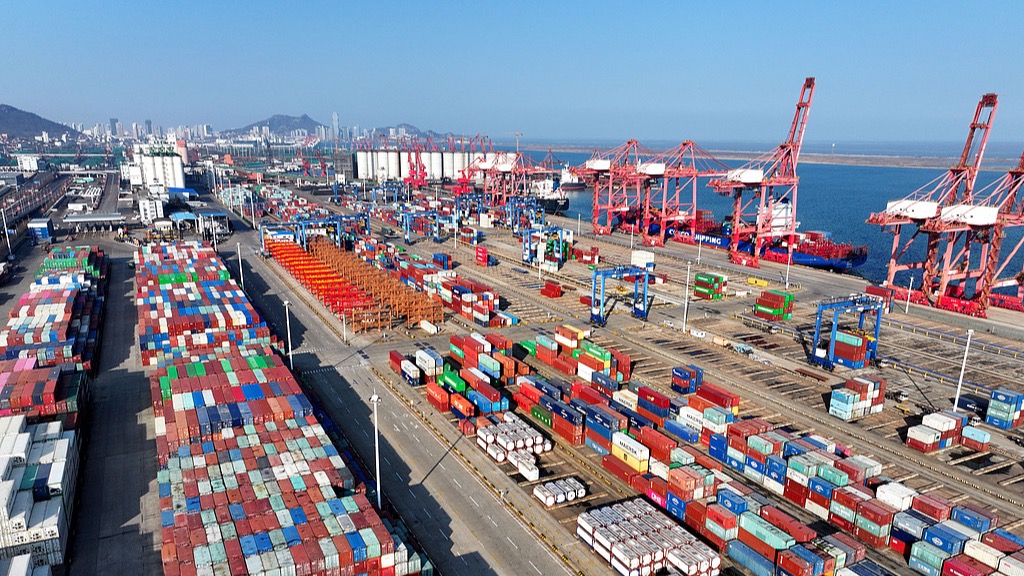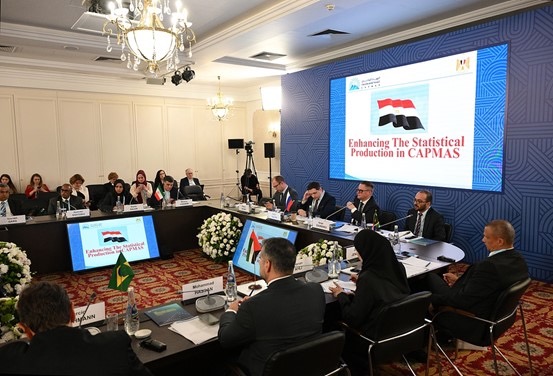Home > > Brewing trade wars: How the Global South can turn the tables
Brewing trade wars: How the Global South can turn the tables
Xu Xiujun

Freighters load containers for international shipment at Lianyungang Port in Jiangsu Province, China, on February 3, 2025. /CFP
The Trump administration announced new 25 percent tariffs on all steel and aluminum imports into the U.S. This move not only further disrupts the global trade order built on World Trade Organization (WTO) rules, but also poses significant challenges to the development of Global South countries.
As a group of economies heavily dependent on international trade, the Global South is particularly vulnerable to both the direct and indirect impacts of such a sweeping trade war. Rising trade barriers and more export restrictions not only hinder these countries' access to key markets, but also disrupt global supply chains, amplifying economic uncertainty across the Global South.
This, in turn, may trigger a chain reaction of broader negative consequences. A particularly pressing concern is the severe challenge trade wars pose to the export-driven growth model that serves as the linchpin of Global South economies. Countries specializing in labor-intensive manufacturing may find their place in the global division of labor eroded, while those dependent on primary commodity exports could face heightened exposure to market volatility.
With protectionism rearing its head again, the Global South must sharpen up its ability to recognize changes, adapt strategically and proactively drive transformation. The Global South should take decisive actions to counter escalating trade frictions and economic challenges, with a focus on cultivating internal growth drivers and enhancing economic resilience.
At the national level, countries in the Global South must fine-tune domestic policies, push through economic transformation and enhance their competitiveness in the global value chain. In an era of rising external uncertainties, the Global South countries must work on adjusting domestic policies to strengthen economic resilience. This requires coordinating fiscal and monetary policies, advancing structural reforms, investing in education and technological innovation and improving the business environment while maintaining a firm commitment to trade liberalization and facilitation.
For resource-dependent countries in the Global South, this presents a valuable opportunity to drive domestic economic transformation by reducing reliance on primary commodity exports and fostering the growth of high value-added manufacturing and service industries. By enhancing industrial competitiveness, these countries can secure a stronger position in the global value chain and fortify themselves against external trade shocks.
Moreover, Global South members should seize the opportunities presented by the digital economy and green economy to create new drivers of trade growth. On the one hand, expanding digital trade and the digital economy can unlock fresh sources of growth momentum for both economy and trade. On the other, developing green industries and green trade, such as exporting clean energy technologies and products, can open up new avenues for long-term economic and trade growth.
At the bilateral and regional levels, Global South countries must diversify their trade partnerships and establish an interconnected global trade network. In response to the U.S. protectionist policies, these countries should actively promote South-South cooperation while seeking trade partnerships with other developed economies. Expanding and diversifying trade partners will help reduce reliance on the U.S. market and mitigate the impact of trade wars.
Among South-South cooperation initiatives, the BRICS framework stands out as a key platform. As an integral part of the three-pillar-driven cooperation model of the BRICS, its economic, trade and financial cooperation has injected strong momentum into economic cooperation among Global South countries.

The 16th meeting of Heads of the BRICS National Statistical Agencies regarding statistics production was held in Kazan, Russia, from October 28 to October 29, 2024. /CFP
Regional cooperation mechanisms such as the Association of Southeast Asian Nations, the African Union, the Arab League, the Community of Latin American and Caribbean States and the Shanghai Cooperation Organization serve as crucial platforms for advancing South-South economic and trade cooperation.
Meanwhile, Global South countries can reduce their dependence on any single market by strengthening regional economic cooperation. On the one hand, by increasing the amount and depth of regional trade agreements, they can lower trade barriers within the region and facilitate the free flow of goods, services and capital. On the other, by enhancing industrial specialization and collaboration within the region, they can improve regional value chains and thereby reduce reliance on developed markets.
At the global level, Global South countries must build a strong consensus against unilateralism and protectionism, uphold the authority of the multilateral trade system and advocate for a fairer, more inclusive and more effective global trade system. Within multilateral institutions such as the WTO and the United Nations Conference on Trade and Development, the Global South can leverage its numerical strengths in membership to better safeguard its legitimate rights and interests.
Global South countries should fully utilize the WTO dispute settlement mechanism and actively promote its reform. When their trade rights are violated, they must promptly file complaints at WTO to safeguard their legitimate interests.
In addition, by participating as third-party observers in trade disputes involving other countries, they can ensure their positions and concerns are represented in global trade rulings. In terms of WTO reform, they should actively engage in relevant discussions and negotiations, putting forward proposals that are in line with the interests of Global South economies.
Within international financial institutions such as the International Monetary Fund and the World Bank, the Global South must actively seek financial and technological support to navigate short-term economic shocks and address long-term development challenges. Strengthening these financial resources will provide a solid foundation to the Global South for a sustainable growth of trade amid the ever-changing world economic and trade landscape.
(Xu Xiujun, a special commentator for CGTN, is a research fellow and director of the Department of Comparative Studies on Chinese and Foreign Affairs of the National Academy of Chinese Modernization at the Chinese Academy of Social Sciences.)
CGTN 2025-02-11
-
AI surge fuels optimism on A-share market
AI surge fuels optimism on A-share market
-
China seeks AI growth benefiting all
China seeks AI growth benefiting all
-
Ne Zha collectibles catch blockbuster movie's coattails
Ne Zha collectibles catch blockbuster movie's coattails
-
China, Africa join hands for bright future
China, Africa join hands for bright future